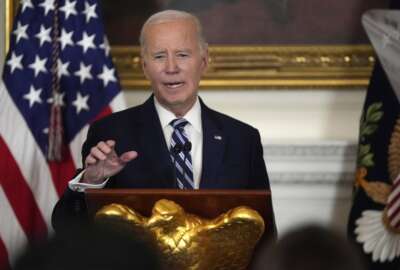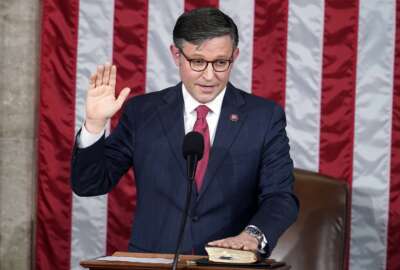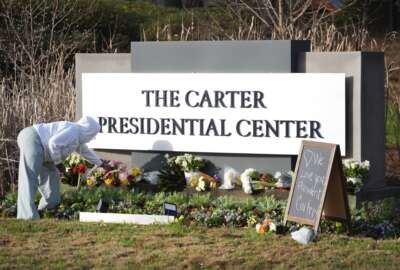France: Analysis shows Syrian government behind sarin attack
France's foreign minister says chemical analysis of samples taken from a deadly sarin gas attack in Syria shows that the nerve agent used "bears the signature" of...
PARIS (AP) — France said that the chemical analysis of samples taken from a deadly sarin gas attack in Syria earlier this month “bears the signature” of President Bashar Assad’s government and shows it was responsible.
Foreign Minister Jean-Marc Ayrault said France came to this conclusion after comparing samples from a 2013 sarin attack in Syria that matched the new ones. The findings came in a six-page report published Wednesday.
In Damascus, Syrian opposition activists and a monitor reported Thursday that a large explosion rocked the Syrian capital, followed by a fire near Damascus airport.
The head of the Syrian Observatory for Human Rights Rami Abdurrahman said the explosion was heard across the capital, jolting residents awake. He said the explosion is reported to have occurred near the Damascus airport road.
Activist-operated Diary of a Mortar, which reports from Damascus, said the blast near the airport road was followed by flames rising above the area. The pro-government site Damascus Now said the explosion was near the city’s Seventh Bridge, which leads to the airport road.
Russia, a close ally of Assad, promptly denounced the French report Wednesday, saying the samples and the fact the nerve agent was used are not enough to prove who was behind it. Assad has repeatedly denied that his forces used chemical weapons and claimed that myriad evidence of a poison gas attack is made up.
But Ayrault said France knows “from sure sources” that “the manufacturing process of the sarin that was sampled is typical of the method developed in Syrian laboratories.”
“This method bears the signature of the regime and that is what allows us to establish its responsibility in this attack,” he added, saying that France is working to bring those behind the “criminal” atrocities to international justice.
France’s Foreign Ministry said blood samples were taken from a victim in Syria on the day of the April 4 attack in the opposition-held town of Khan Sheikhoun, which killed more than 80 people.
Environmental samples, the French ministry said, show the weapons were made “according to the same production process as the one used in the sarin attack perpetrated by the Syrian regime in Saraqeb” on April 29, 2013.
Ayrault said French intelligence showed that only Syrian government forces could have launched such an attack — by a bomber taking off from the Shayrat air base, which was later targeted in a retaliatory U.S. missile strike.
France’s presidency said the country’s intelligence services presented evidence showing the Syrian government “still holds chemical warfare agents, in violation of the commitments to eliminate them that it took in 2013.” It said that information will be made public, without offering details.
It’s thought that Assad’s government still has a stockpile of tons of chemical weapons, despite saying it had handed over all of them.
Kremlin spokesman Dmitry Peskov said Russia’s position on the attack is “unchanged,” and that “that the only way to establish the truth about what happened… is an impartial international investigation.”
Russia has previously called for an international probe, and Peskov expressed regret that the Organization for the Prohibition of Chemical Weapons, or OPCW, has turned down the Syrian government’s offers to visit the site of the attack and investigate.
The French minister’s comments came as the OPCW, which is investigating the April 4 attack, held a ceremony in The Hague marking the 20th anniversary of the Chemical Weapons Convention.
In a video message to the ceremony, U.N. Secretary-General Antonio Guterres said the organization’s progress over two decades seeking to eliminate chemical weapons is now under threat.
“In the Middle East, belligerents are breaking the norm against chemical weapons,” he said. “The recent attack in Syria was a horrific reminder of the stakes. There can be no impunity for these crimes.”
The United States has also blamed Assad’s government for the April 4 attack. The Trump administration ordered the cruise missile attack on the air base and issued sanctions on 271 people linked to the Syrian agency said to be responsible for producing non-conventional weapons. Syria has strongly denied the accusations.
Earlier Wednesday, Russian Foreign Minister Sergey Lavrov said the U.S. strike damaged the prospects of a political settlement for the war-torn country.
Lavrov told a security conference in Moscow the U.S. response “pushes the prospect for a wide international front on terror even further away.”
He also dismissed claims that international experts cannot visit the site in Khan Sheikhoun because of security precautions and criticized the OPCW for failing to go there. Lavrov says claims that the experts were warned by a U.N. body against traveling to the location because it’s unsafe are “lies,” adding that Moscow went back to the U.N. and found out that there was no such warning.
Defense Minister Sergei Shoigu said Russia had to boost security measures at its air base in Syria after the U.S. strike at the Syrian base. Russia has been waging an air campaign since 2015 to help Assad’s forces in the civil war.
___
Vasilyeva reported from Moscow. Associated Press writers Mike Corder in The Hague, Netherlands, and Philip Issa in Beirut contributed to this report.
Copyright © 2025 Federal News Network. All rights reserved. This website is not intended for users located within the European Economic Area.





